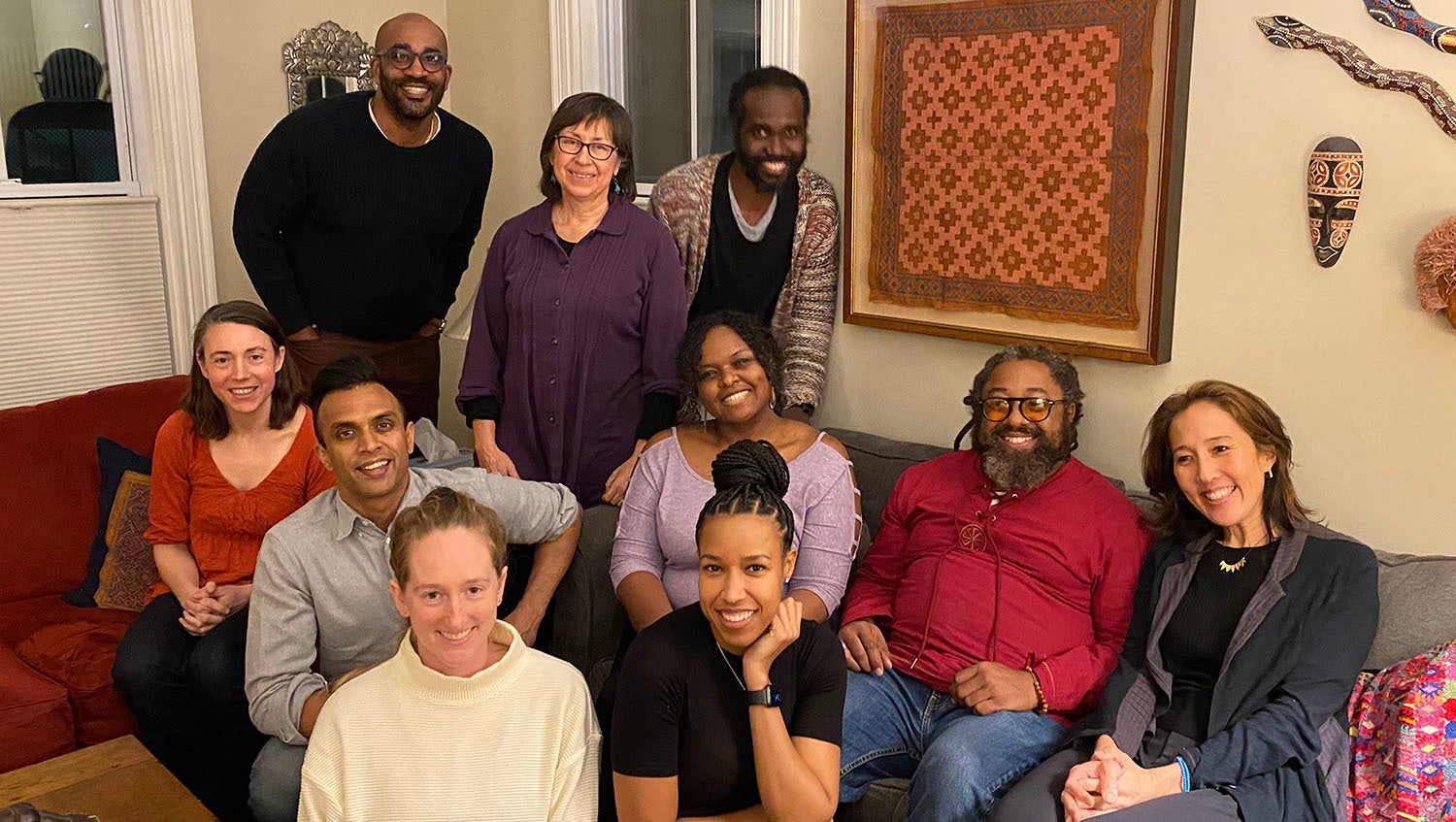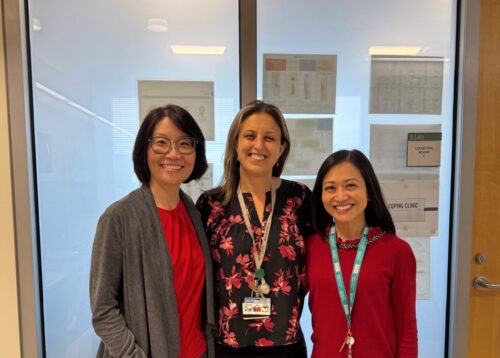How Can We Make Addiction Care More Appealing and Effective for Black Patients?
May 11, 2023

Boston Medical Center
The Grayken Center for Addiction: left to right (in the back): Phillip Reason, MSW, MPH; Miriam Komaromy, MD; Kaku So-Armah, PhD; (Middle, left to right): Amy Yule, MD; Avik Chatterjee, MD, MPH; naTrina Johnson, M.S., PhD; Craig McClay; Christina Lee, PhD; Front (left to right): Corinne Beaugard, MSW; Daneiris Heredia-Perez, MSPM (Photo: Boston Medical Center)
The team at BMC's Grayken Center for Addiction is undertaking a major project to answer this question by tapping into the wisdom of Black community members
The death toll from drug overdoses, particularly opioid overdoses, continues to rise in the U.S. In recent years, the overdose death rate for Black people has increased more than that of any other racial and ethnic group. At the same time, research shows that Black patients are far less likely than white to be prescribed medication for opioid use disorder, a known and effective treatment.
These trends add new facets to an old problem: From higher arrest rates and harsher prison sentences for drug offenses to insufficient access to care, people of color — especially Black people — have long faced inequitable treatment around substance use disorder (SUD).
“There are racial disparities and injustices everywhere that you look — in the risk factors for SUD, the consequences of SUD, access to treatment for SUD, and benefits of treatment for SUD,” says Phillip Reason, MSW, MPH, co-facilitator of the grant-funded project “Embracing Anti-Racism in Addiction Treatment, Research and Policy: Engaging Black People with Lived Experience of SUDs.” Reason also works as the multi-visit patient project manager in the Population Health Department at Boston Medical Center (BMC), working to reduce emergency department utilization among the highest-frequency visitors.
“There are racial disparities and injustices everywhere that you look — in the risk factors for SUD, the consequences of SUD, access to treatment for SUD, and benefits of treatment for SUD.”
Even at BMC, where the Grayken Center for Addiction offers a robust array of services for people with SUD, Black patients coming into the Emergency Department for SUD-related crises are 16% less likely than white patients to engage in any follow-up treatment in addiction programs. Grayken Center medical director, Miriam Komaromy, MD, convened a group to consider what could be done to address the inequities she was observing in SUD treatment. Komaromy is principal investigator to Reason’s co-investigator on this anti-racism project.
Grayken Center researchers are now undertaking a major research focus to examine the “why” of addiction care disparities and rethink and redesign SUD care to answer the vital question: How can we make addiction treatment more appealing and effective for Black patients?
Engaging and including people with lived experience of addiction
The best way to find answers, the Grayken team decided, was to engage Black people in the Boston area with lived experience of SUD.
As a Black person and Boston native who is currently in recovery for substance use disorder himself, Reason is uniquely positioned to guide the project from dual perspectives of life experience and academic and clinical training.
In 2021, the Grayken team reached out in Boston’s predominantly Black neighborhoods and invited Black people living with SUD to participate in a series of initial focus groups.
“We went into the community to really ask people with lived experience why this was happening. The project is largely informed by ‘the people closest to the pain,'” Reason says, borrowing a favorite quote from U.S. Congresswoman Ayanna Pressley, who represents Massachusetts’ 7th District, a predominantly Black and Latinx area.

BMC’s Avik Chatterjee, MD, MPH, presenting at one of the four convenings. (Photo: Boston Medical Center)
Alongside Reason is community engagement facilitation specialist Craig McClay, who has been the lead facilitator for the NIH funded project, Healing Community Studies at BMC.
“The challenge in a lot of these spaces is that the environment does not provide a platform that nourishes and encourages multi-directional conversations involving people that would not normally have this conversation,” McClay says, “Nevertheless, this centers the voices of folks who have most often been marginalized. That unique perspective is needed to get to where we all want to get to, which is saving lives.”
From the focus group discussions, the Grayken team distilled four major topic areas under addiction care to explore in greater depth:
- Provider factors
- The impact of trauma
- Systemic factors
- Patient factors
They recruited a half-dozen focus group participants who stood out as leaders to join a new Council of Experts in Patient Experience (CEPE). This group would receive community-engaged research training and attend further convenings as lived-experience experts.
Convening a range of addiction experts
From October 2022 into January 2023, four day-long conferences took place at Roxbury Community College, which were largely funded by the Patient Centered Outcomes Research Institute (PCORI). The conferences brought together a range of local and national addiction experts: social workers, peer coaches, researchers, physicians, nurses, and the CEPE members. Most of the experts at all levels were Black — a rare environment for Boston, Reason says, and one that helped build trust with those who had lived experience.
The racial makeup was not lost on CEPE member Calvin. In the past, Calvin says, he’s seen researchers who say they intend to target certain populations and problems, but “when you sit down and hear them, they’re going farther and farther away from what they say they’re trying to do.”
In the convenings, he saw something new.
“We were there to talk about what’s needed for people of color to come into medical treatment and how to keep them there,” Calvin says. “So when I saw the people in the room, I knew this was going to be something totally different. It was people with lived experience, people with PhDs, and people asking the hard questions and actually listening.
“So when I saw the people in the room, I knew this was going to be something totally different. It was people with lived experience, people with PhDs, and people asking the hard questions and actually listening.”
Creating space for honest discussions about addiction and racism
With an agenda of ice-breakers, presentations, and small-group sessions, the multidisciplinary participants worked together to share experiences of addiction treatment and to forge ideas for action.
Those living with SUD spoke of situations where white patients were treated differently than patients of color. For example, they described programs where white patients who violated cell phone use rules, showed up late, or broke curfew were treated more leniently. They described interactions with staff or providers that felt demeaning, and how, as stories of these experiences made their way to Black communities, reluctance to seek treatment grew.
CEPE member Michelle can tick off a host of things that didn’t feel right when she was initially seeking treatment. A major problem, she recalls, was a sense of being viewed through a lens of lowest expectations.
“What’s left a horrible taste in my mouth is when you go to a facility and they’re surprised that you’ve had anything positive in your life. That triggers something for me,” Michelle says. “We’re not supposed to be intelligent, we’re not supposed to have had good jobs — we’re supposed to just have this problem and not have those other things in life. That’s an insult. And it shows a problem in society, like you’re the exception rather than the norm.”
A common tale that bubbled up in the sessions was a sense of fear and distrust among Black parents with SUD that if they seek help for their addiction, their children will be taken away.
“Are they going to try to take my children? That’s a big one for Black families,” Michelle says. “They want to come clean, but they’re afraid.”
Michelle, who works in a health center, also has ideas for solutions. She recommends more sensitivity and cultural awareness training at all levels, as well as care providers with lived experience: “We need to have more [care] representatives who have walked in our same shoes. Patients need someone who looks like them and has been through the same thing,” she says.
“We need to have more [care] representatives who have walked in our same shoes. Patients need someone who looks like them and has been through the same thing.”
Calvin’s lived experience is witnessing his parents struggling with SUD and not getting the services they needed. In one session, the group discussed factors that would make an ideal place to seek addiction treatment. What resonated for him were ideas around overcoming the challenges treatment poses for parents with SUD who may have to travel a good distance to get to treatment and/or can’t bring their children with them.
“That’s a place I could have flourished — a situation where my brother and I could have been with my mother while she was in treatment. I think people [in treatment] should have an option to be closer to family,” he says.
Next steps to change addiction care for Black patients
As the Grayken Center’s antiracism project proceeds, next steps include publishing initial findings and starting to try out action items. Longer-term goals are to continue to collaborate with the members of the CEPE, to research key unanswered questions, and to launch similar processes to learn how to effectively serve Latinx communities and other communities of color who are affected by SUD.
“This project doesn’t end here. We will continue digging deeper into areas that are important but require more research,” says Daneiris Heredia-Perez, MSPM, senior research project manager supporting this project at Grayken. “More importantly, we will honor the stories and recommendations we heard from the CEPE by encouraging providers and community members to implement these action items. There is an opportunity here to have major impact and we are going to take it.”
Reason, echoing Calvin and Heredia-Perez, notes that outside experts tend to come in and say they know what’s right for specifically underserved communities. In his view, the Grayken project is doing the opposite, from the engagement process to the research question itself.
“‘How to make treatment more appealing for Black people’ — that’s radical language,” he says. “The Grayken Center was intentional about this research, going into the community and bringing people onto the team that reflect the community, that have value in the community, and that have a commitment to advancing and improving the health and wealth of Black folks, Black Bostonians. And that, for me, is groundbreaking.”
To learn more about this project please email project manager Daneiris Heredia-Perez.


